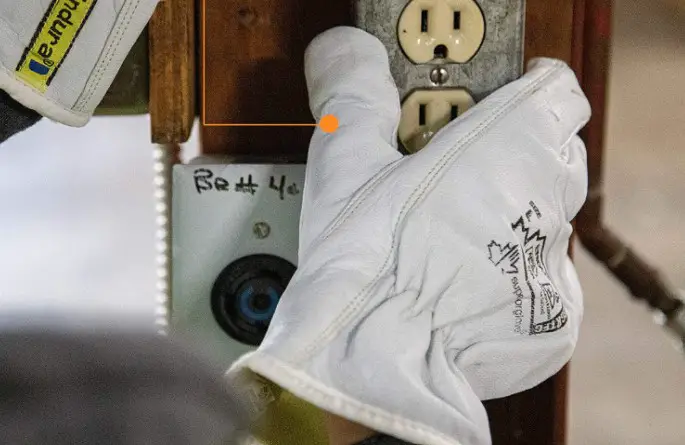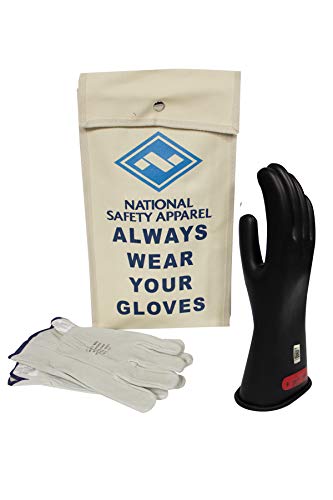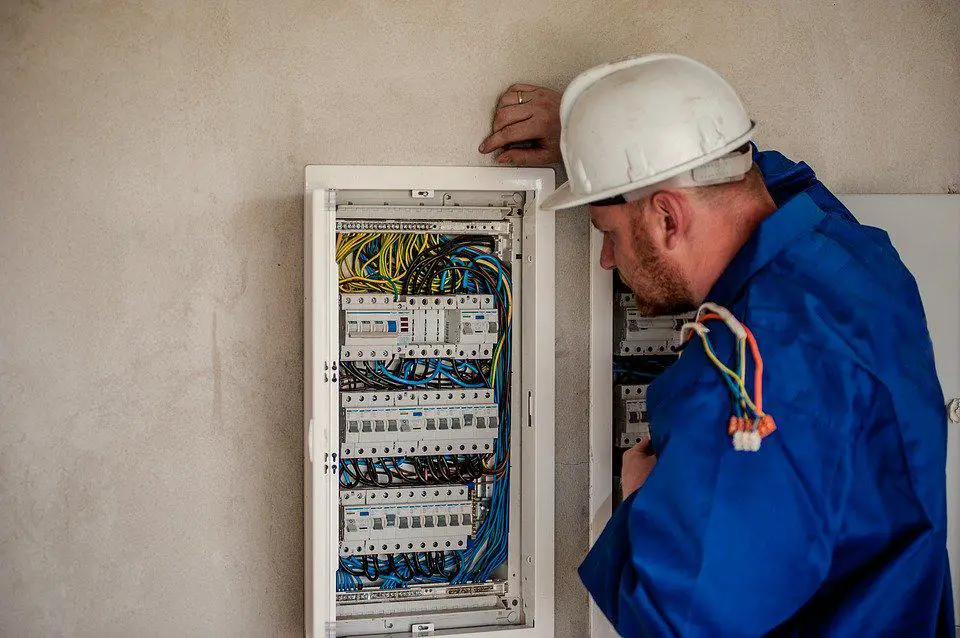Are you an electrician?
Or you might be someone who is interested in fixing the electrical wirings of your own house!
What you need is a good pair of electrical insulation gloves to save you from getting electrocuted in case you come in contact with live wires!

While leather gloves can save you from the cuts and are very heat-resistant, they are not the best choice for electrical works. Leather does not guarantee any electrical protection for you unless the voltage is between 50 to 450 volts.
But according to OSHA 1910.269, if you are working with voltage higher than 50 volts, you need to wear safety glove that is voltage-rated and leather gloves obviously do not fall in that category.
But you should definitely get a leather protector glove in order to save yourself from the cuts and injuries while working with cables and wires.
Through the course of this article, I will tell you more about the usage of leather gloves for electrical works and what is the best choice in gloves when it comes to protection against electricity!
Also, you will come across some of the best leather protector gloves that are recommended by our experts after deep research and study!
So, let’s delve deep…
How much voltage can you handle in leather gloves?
While it is not possible for a leather glove to offer protection against electrical shocks, yet for domestic works where the voltage rate is lower than 480 volts, a leather glove should be sufficient for you.
But, if you are thinking of wearing a leather glove for industrial use, there are ways in which you can use a leather glove to provide you with the electrical insulation up to 17000 volts:
1.) Wear an insulating rubber glove inside the leather protector glove
2.) Choose a leather glove that has a rubber lining within for protection against electrical hazards
3.) Choose leather gloves that have moisture wicking lining to absorb the moisture from the hands because moisture is a good conductor of electricity
4.) The leather gloves should be of properly fitted to your palm
5.) Better if the leather gloves meet Class 0 ASTM standard regarding safety gloves
Are leather gloves safe for electrical work?
Leather gloves can be safe for electric works not exceeding voltage over 400volts, which mainly involves domestic indoor electrical works. Working with leather gloves in any higher voltage would require the use of insulated rubber gloves!
Pros and cons of using Leather Gloves
Let’s have a quick look at some of the advantages and disadvantages of wearing leather gloves for electrical works:
Pros of using leather gloves:
√ Electrical works involve lots of cut and puncture hazards, therefore leather gloves are the best choice for protecting against cuts and punctures
√ Heat is another factor you might have to deal with while doing electrical works, and leather gloves prove excellent in providing insulation against heat
√ Breathability is another important sought-after factor in electrical works which builds heat inside the gloves and therefore leather is the perfect material for the purpose as leather is porous in nature which allows excellent air flow
Cons of using leather gloves:
⊗ Leather is animal skin and therefore does not guarantee electrical insulation
⊗ Leather also absorbs moisture which is not great for electrical works
Do leather gloves protect from electrical shock?
Leather gloves will only protect from electrical shocks when coupled with insulated rubber gloves within. That is, you need to wear a rubber glove beneath the leather glove for electrical protection.
Which gloves are safe for working with electricity?
For 1005 electric protection, you need to wear gloves that are made of rubber because rubber is a bad conductor of electricity and besides that the rubber gloves also offer great grip when it comes to holding tools and also are resistant to cuts and punctures.
Recommended Leather Protector Gloves for Electrical work
Best leather protector gloves along with rubber insulated gloves:
- Pair of Class 0 Rubber Voltage Insulating Gloves; Pair of 10 Leather Protectors for gloves; Glove bag for easy storage
- NFPA 70E-2015 compliant for arc flash; CSA Z462-15 compliant for arc flash (Canada); ANSI/ASTM D120, Class 00, Type 1; Max use voltage 1,000V AC/1,500V DC
- ENHANCED PROTECTION
- Available in sizes 8-12
- Hand circumference - 8-9 inch
Prices pulled from the Amazon Product Advertising API on:
Product prices and availability are accurate as of the date/time indicated and are subject to change. Any price and availability information displayed on [relevant Amazon Site(s), as applicable] at the time of purchase will apply to the purchase of this product.
If you want high voltage protection, these combo of rubber as well as leather gloves are just perfect for you as the rubber gloves comply with Class 0 ASTM standards that provide protection against 1000 VAC and the leather protectors are there to save the rubber gloves from any wear and tear.
Best arc flash resistant leather work gloves:
- CUT RESISTANT
- ABRASION RESISTANT
- ARC FLASH TESTED
- ANSI cut-level A4 and Puncture Resistance ASTM level-3.
Prices pulled from the Amazon Product Advertising API on:
Product prices and availability are accurate as of the date/time indicated and are subject to change. Any price and availability information displayed on [relevant Amazon Site(s), as applicable] at the time of purchase will apply to the purchase of this product.
These gloves are definitely very comfortable and are lined with Kevlar which ensures resistance against any cut and puncture and they have got ATPV rating which protects against 36 cal/cm of arc flash.
Best leather protector gloves for low voltage:
- Constructed from all pearl kid leather for superior durability
- Pull strap and plastic buckle for easiest wear
- Electrical gloves
- For Use With Rubber Electrical Insulating Gloves
Prices pulled from the Amazon Product Advertising API on:
Product prices and availability are accurate as of the date/time indicated and are subject to change. Any price and availability information displayed on [relevant Amazon Site(s), as applicable] at the time of purchase will apply to the purchase of this product.
If you require gloves for domestic use, these are the best choice as they provide low voltage protection and rated Class 0, 00 according to ASTM standards. They offer excellent cut resistance and they must be worn over a rubber glove for better protection.
See also: Should Electricians Wear Steel Toe Boots?
And it’s a wrap!
That’s all with leather gloves for electrical use!
Before we wind up, the take away for you is:
ALWAYS WEAR A RUBBER GLOVE FOR ELECTRICAL INSULATION BELOW THE LEATHER PROTECTORS!
Hope you enjoyed reading this article, stay tuned for more such exciting posts on work wears!
Till then…
Take care and stay fit!










